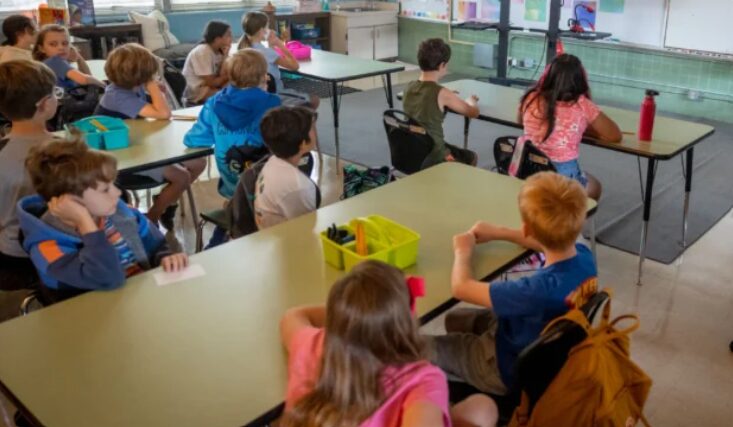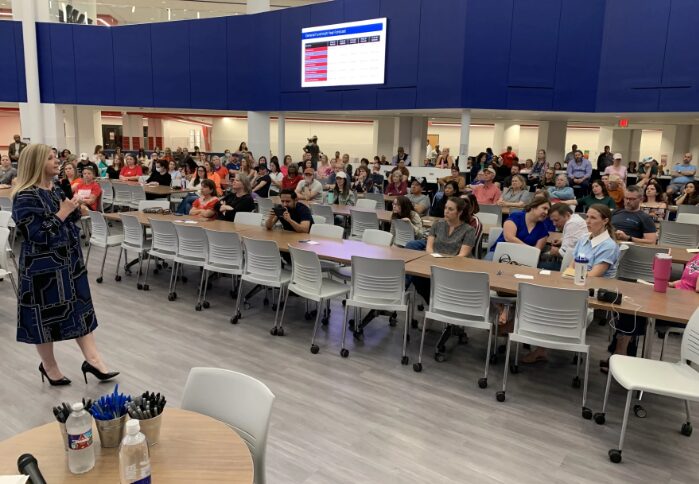
Parents across Texas are rightfully concerned about the current budget cuts in the public education system that are causing chaos in schools throughout the state. Teachers, as well as school and district administrators alike, grow continuously frustrated with the lack of fiscal management in Austin, whose effects have trickled down to the classrooms and are wreaking havoc on the necessary accessibility to essential resources. The way it usually works is, that every two years, lawmakers convene to determine how much money to allocate to schools. Strong resistance was expressed to Governor Greg Abbott’s push for a voucher program that would transfer public monies to private schools, which resulted in them departing without a negotiated deal in 2023, causing districts across the state to struggle financially as the 2024 school year begins. Even despite a $30 billion state surplus, along with the consideration of inflation, recent damage from storms, etc., the current parliamentary session disappointingly ended without an increase in the basic student stipend.
According to Zeph Capo, president of the Texas American Federation of Teachers, “More than $4 billion allocated for schools is not being used because our governor threw a temper tantrum.”
The effects are definitely being felt locally, as schools such as Harvard Elementary were grappling with heat advisories and air conditioning that still needed to be repaired by the first week of school. HISD released the following statement, “Although many of our systems are older and need frequent attention, the HISD team is hard at work identifying and addressing any issues with air conditioning in our schools. We are aware that several schools have ac issues in a handful of classrooms and we are working to address those issues with both immediate and long-term solutions. The students who are impacted by those few classrooms have been temporarily moved to other air-conditioned spaces in their school buildings so they can continue to learn in comfortable and productive environments. Out of HISD’s 274 schools, we are aware of four schools with ac issues impacting a handful of classrooms. We are working to resolve the issues as quickly as possible. Temporary solutions are in place to ensure that students are learning in a comfortable and safe environment.”
Extracurricular programs have been cut, special education programs have been gutted, and many campuses have eliminated librarians altogether. Alief ISD Deputy Superintendent Charles Woods says “We have to figure out ways to cut things that are no longer absolutely necessary.” Unfortunately, school transportation is not mandated under state law, so it has been one of the most tangible cuts affecting the everyday lives of parents and students in some of the hardest-hit districts.
Cypress-Fairbanks ISD has been just one of the districts most affected by the elimination of bus routes and the decrease in transportation options. In Cy-Fair, the transportation budget was cut by $4,780,035. This included major changes such as a district-wide reduction of 79 buses, as well as the complete removal of transportation options for Alternative Learning Centers, which already require parents of ALC students to adhere to strict drop-off and pick-up time regulations. In Cypress, many main streets are without sidewalks, as well as traffic lights, but fall within the new transportation guidelines so they exclude the students who must now walk these routes from access to school allotted transportation. Many parents have been forced to choose between having their children walk on extended unlit, unsafe paths to school, even in treacherous weather, or leaving home and work almost an hour and a half earlier than usual to avoid the excruciating wait in the drop-off and pick-up lines.
Below is an example of just some of the recent changes in qualification for transportation in Cy-Fair ISD:
Elementary school students who live within one mile qualify if:
-Crossing a tollway, state highway, and/or farm-to-market road;
-Crossing a moderate to heavily traveled thoroughfare without protected crossing (i.e., traffic light or stop sign);
-Walking along a moderate to heavily traveled thoroughfare without a safe walking path; and/or
-Crossing a railroad track.
Middle school students who live within two miles qualify if:
-Crossing a tollway; state highway, and/or farm-to-market road;
-Crossing a four-lane or more, heavily traveled thoroughfare without protected crossing (i.e., traffic light or stop sign); and or
-Crossing a railroad track.
High school students who live within two miles qualify if:
-Crossing a six-lane roadway with a speed limit of over 45 mph; and
-Crossing a tollway, state highway, and/or farm-market road.
Woods, of Alief, says that school closures are unfortunately a real possibility. He says, “It’s not unforeseen for a district to get to that level. It would be tragic if it happened because of this because everything I’ve said today didn’t have to be. People need to stand up and do what’s right for the kids, which is the future of this state.”
According to a recent survey by the Kinder Institute for Urban Research, over 73% of school districts in Texas lack adequate funding, with 17% being categorized as “severely” underfunded. According to the report, districts that have greater funding gaps generally have poorer student success ratings from the Texas Education Agency, frequently receiving grades of “C” or below. There are even shortages in certain Houston-area districts that go above 40% of what is required to run effectively.
Many of these cuts affect students on a daily basis, affecting their ability to learn and retain important lessons. Whether it is a lack in transportation, changes in access to free school lunch, or just overall safety from your everyday school shooting, we owe it to our children to invest and give them the foundation for the best future possible, and that doesn’t mean making it harder for the ones who already have it harder in the first place, by no fault of their own.
Nippy said it best, “I believe the children are our future, teach them well and let them lead the way..” She didn’t mean only the children whose parents were afforded the generational luxury of being able to come out of pocket for private school or only the children who lived within a two-mile radius of their campus. There are necessary educational resources being held up in communities that desperately need them because the state legislation decreased access to underprivileged students to increase resources to those who already have the resources. Can the legislature call this equity?
Texas children deserve better than to be collateral damage to the politics and misplaced ambition of the Texas Legislature.
Change starts YESTERDAY.






